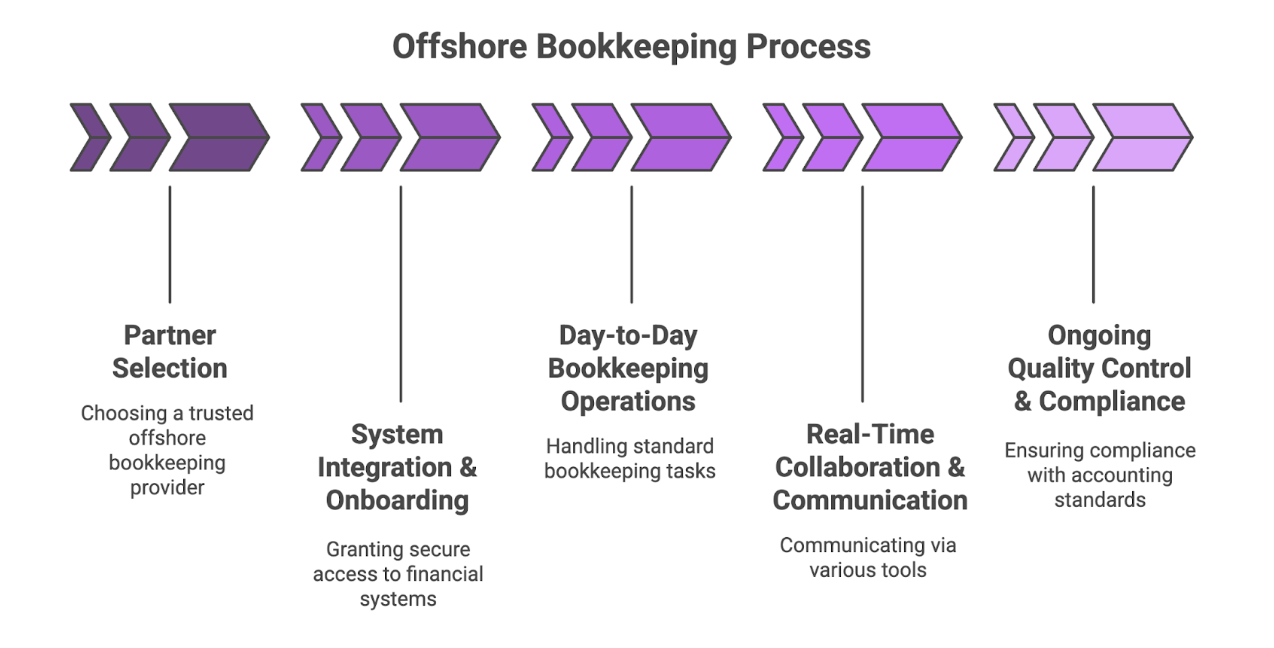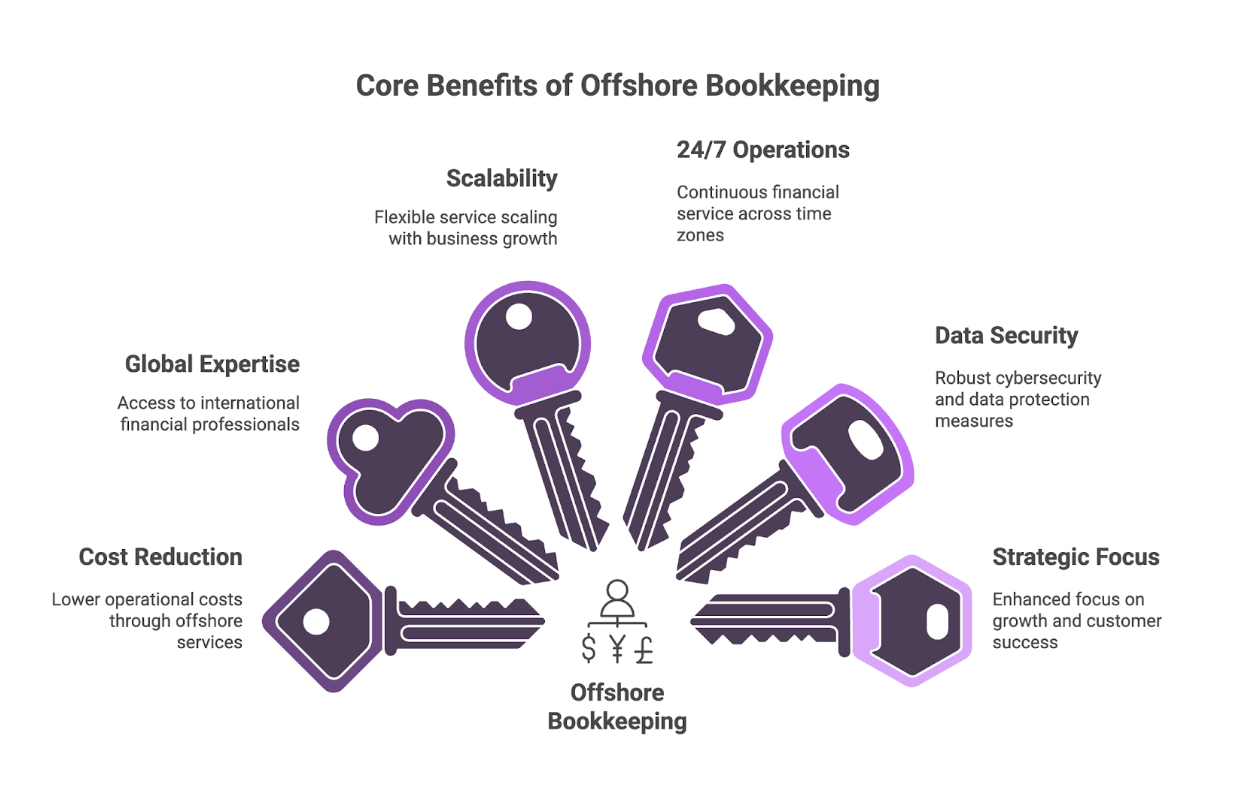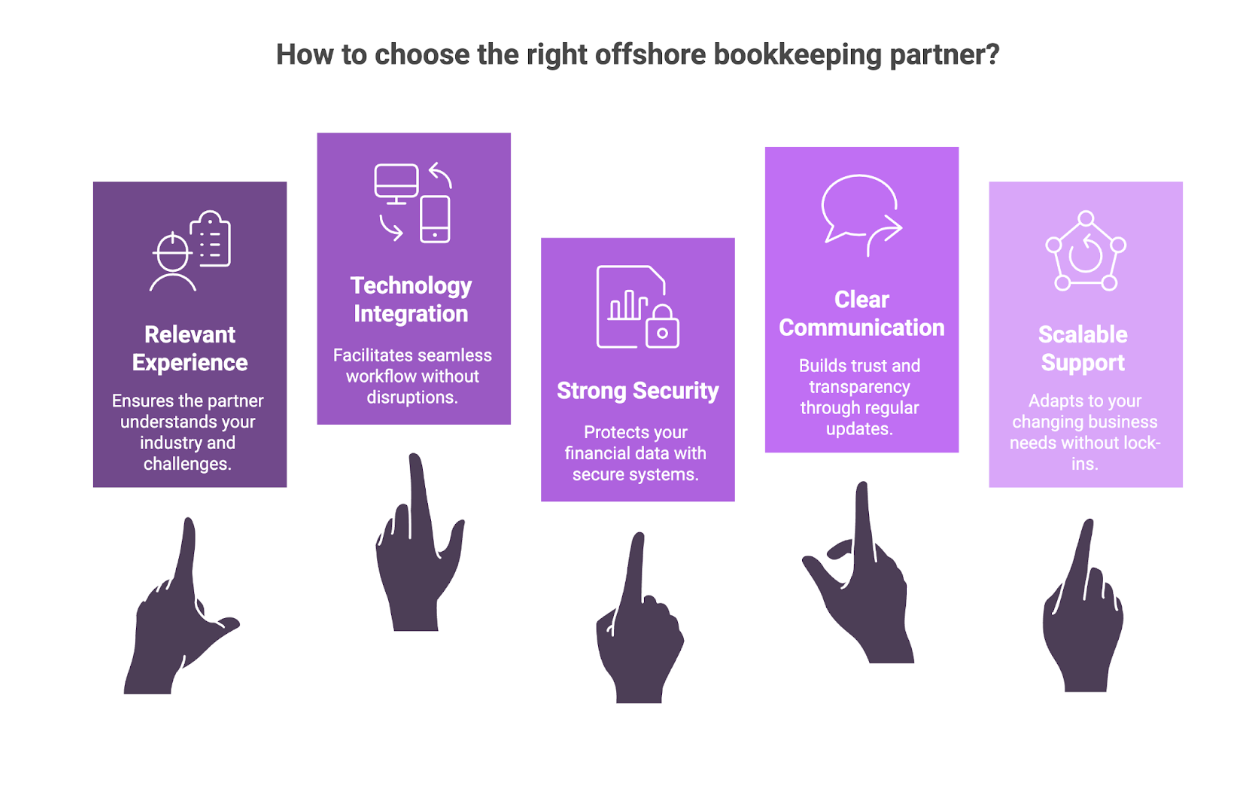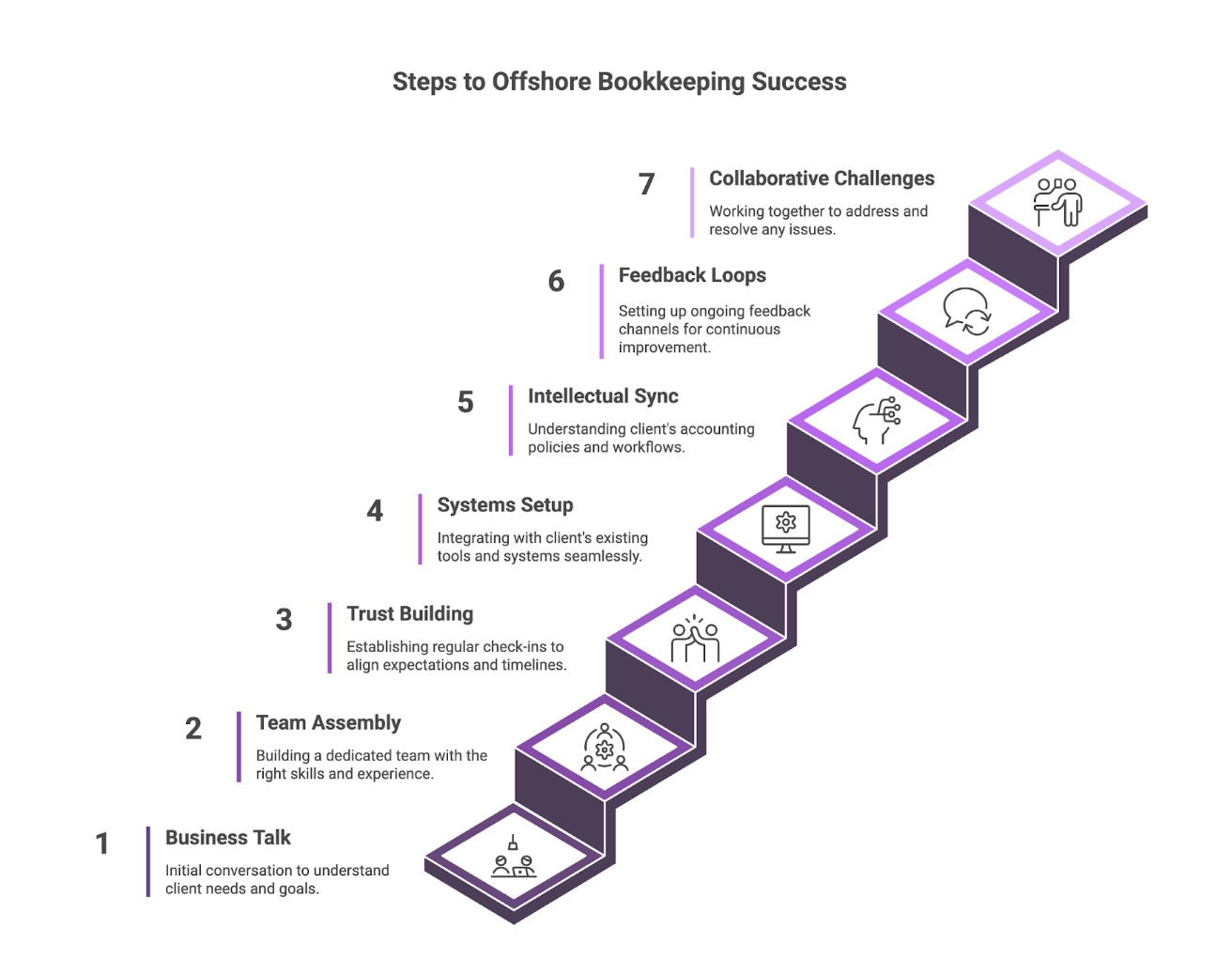Bookkeeping is one of those things every business needs, but few enjoy doing. It’s time-consuming, repetitive, and often pulls your team away from bigger goals. That's why more businesses today outsource their bookkeeping offshore, not to cut corners, but to work smarter.
Offshore bookkeeping means handing over your financial record-keeping to professionals in other countries, and it’s changing the game. From startups to growing enterprises, companies are realizing they can save big, access better talent, and free up time to focus on what really matters.
Yes, cost savings are a big part of the story. But that’s just the beginning.
Offshore bookkeeping also gives you flexibility than in-house bookkeeper, it is has faster turnaround times, and financial expertise you might not find in-house.
Let’s break down how this simple shift to online bookkeeping can grow your business and make it leaner, sharper, and way more efficient.
Offshore bookkeeping is the strategic practice of outsourcing your financial record-keeping to specialized firms in other countries. It’s not just about cutting costs, it’s about tapping into global financial expertise, optimizing operations, and building a scalable, efficient back office.
At its core, offshore bookkeeping allows businesses to delegate time-intensive tasks, like tracking transactions, managing payables and receivables, and preparing financial statements, to qualified professionals abroad. These firms often offer high-quality services at competitive rates, giving businesses a smart way to maintain accuracy without inflating overhead.
Key functions typically handled by offshore bookkeeping providers include:
By shifting these functions offshore through virtual bookkeeping services, businesses reduce operational load, increase accuracy, and ensure compliance with international accounting standards. Plus, with providers working across different time zones, you gain the advantage of virtual bookkeeping flexibility. 24/7 service coverage and faster turnaround times.
In short, offshore bookkeeping services give businesses the flexibility to focus on growth and strategy, while leaving the numbers to the pros.

Offshore bookkeeping works by outsourcing your financial processes to skilled professionals in global locations,typically where labor costs are lower, but accounting expertise is high.
It’s a seamless, tech-enabled partnership that lets your business stay financially sharp without increasing internal headcount.
Here’s how it typically works:
1. Partner Selection is vital when you choose to outsource your bookkeeping, as you’re trusting someone with your financial backbone.
It starts with choosing a trusted offshore bookkeeping provider. Look for firms with a proven track record, strong data security protocols, and experience working with businesses in your industry.
2. System Integration & Onboarding
Once the partnership is in place, you’ll grant secure access to your financial systems,like accounting software, invoicing tools, or ERP platforms. Offshore teams are trained to work with platforms like QuickBooks, Xero, Zoho Books, and NetSuite.
3. Day-to-Day Bookkeeping Operations are crucial for maintaining accurate financial records.
Offshore teams handle all standard bookkeeping tasks, including:
4. Real-Time Collaboration & Communication
Communication happens via email, Slack, Zoom, or your project management tool of choice. Time zone differences often work to your advantage, allowing overnight processing and faster financial reporting.
5. Ongoing Quality Control & Compliance
Reputable offshore bookkeeping services ensure your financials comply with local and international accounting standards (such as GAAP or IFRS), and they often have the expertise to manage your financial records efficiently. built-in checks and balances to minimize errors.

With offshore bookkeeping, you’re not just outsourcing work,you’re building a lean, expert-led finance function that supports smarter decision-making, greater agility, and long-term scalability.
For growth-focused businesses, hiring offshore bookkeepers can be a strategic move. offshore bookkeeping services aren’t just a cost-saving tactic, they’re a competitive edge. By shifting financial operations to expert offshore teams, companies unlock both Operational efficiency is crucial for any business owner looking to improve their processes. and strategic flexibility.
Here are the core benefits that make offshore bookkeeping processes a high-impact move for modern businesses:
The most immediate and measurable benefit is cost savings. Offshore bookkeeping firms, particularly in countries with lower labor costs, offer top-tier accounting services at a fraction of the in-house cost. This includes savings on outsourcing bookkeeping services and improving overall efficiency.
By reallocating financial resources more effectively, businesses can reinvest in growth, innovation, or customer experience.
Offshore bookkeeping gives you access to a global talent pool of certified bookkeepers, accountants, and financial analysts. These professionals are well-versed in tools like Xero, QuickBooks, and global compliance standards, which is essential for any bookkeeping service provider.
You gain:
This means more accurate books, better reporting, and stronger strategic insights.
Whether you're a startup or an established enterprise, offshore bookkeeping services scale with you. You can ramp up or down without the hassle of recruitment or restructuring.
This flexibility enables:
With teams operating in different time zones, remote bookkeeping enables round-the-clock service. While your team sleeps, your books get updated. This leads to improved efficiency and accuracy in your core business operations.
Leading offshore providers invest heavily in cybersecurity, data encryption, and cloud-based infrastructure. You benefit from enterprise-grade tools and protocols without the capital expenditure.
Features often include:
By offloading transactional finance tasks, your internal team can redirect focus to what matters most, growth, product, and customer success. Offshore bookkeeping frees up decision-makers to:
In short, offshore bookkeeping isn’t just outsourcing,it’s upgrading. It helps modern businesses stay lean, agile, and financially intelligent in a competitive market through effective bookkeeping and accounting practices.

If you run an accounting firm, you already know the pressure: deadlines pile up, clients need more, and hiring good talent isn’t easy, or cheap. That’s where offshore bookkeeping Utilizing online bookkeeping can really help.
Offshore partners provide reliable bookkeeping assistance that lets you expand your capacity without increasing your payroll, making them a great choice for business owners. Instead of taking on more full-time staff, you get a ready-made team that can handle routine bookkeeping work while your in-house team focuses on high-value client services.
Here’s how accounting firms typically use offshore bookkeeping:
This kind of setup helps you deliver faster, keep costs low, and take on more clients without burning out your team.
Plus, a good offshore partner becomes more than just a vendor, they’re part of your extended team. Over time, they get to know your systems, your client expectations, and how you like things done. That kind of consistency is hard to find, and it’s one of the biggest reasons firms stick with outsourced accounting services long-term.
In a market where client expectations are rising and margins are tighter than ever, offshore bookkeeping gives accounting firms a practical way to scale, without losing control or quality.
Businesses often worry about data security when considering offshore bookkeeping. To address this, ensure the provider implements robust cybersecurity measures. Look for firms that use encryption and secure data centers when choosing an online bookkeeping service.
Another concern is communication barriers. Time zone differences and language can pose challenges, especially when hiring offshore bookkeepers. Choose a provider with multilingual capabilities and flexible working hours. This ensures smooth and effective communication.
Finally, companies may fear loss of control over processes. Clear contracts and regular reporting can mitigate this worry. Establishing a communication plan helps maintain oversight and trust.
Choosing an offshore bookkeeping partner is a big decision,and it’s not just about lowering costs. You’re trusting someone with your financial backbone, so finding the right fit for your offshore bookkeeper matters.
Here’s what we recommend looking for (and what we focus on ourselves):
It’s not enough to know bookkeeping,we believe your partner should understand your industry, your pace, and your specific challenges. At Madras Accountancy, we’ve supported startups, SMBs, and accounting firms across the US, UK, and Australia since 2015, so we know what smooth collaboration looks like.
No one has time for messy tool migrations or complicated setups. We work with platforms like QuickBooks, Xero, Zoho, and NetSuite daily, so we integrate cleanly into your workflow without disrupting it.
We take data security seriously. Our systems are built around secure access, encrypted transfers, and strict internal controls. You’ll always know where your data is, who has access, and how it’s being handled.
We don’t disappear behind emails. Our team sets clear expectations, shares regular updates, and makes sure you’re always in the loop,because good bookkeeping is built on trust and transparency.
Whether you’re just getting started or managing dozens of clients, we scale with you. Our flexible service plans allow you to increase or reduce support based on your changing needs,no lock-ins, no drama.
If you're looking for a partner who treats your books like their own, we’d love to help.
At Madras Accountancy, we offer offshore bookkeeping services designed to be accurate, secure, and genuinely helpful. We don’t just follow a checklist,we adapt to how you Work and build long-term relationships that grow with your bookkeeping and accounting needs.
Feel free to reach out if you want to explore how we can support your team. We’re always up for a conversation.

We know that handing over your bookkeeping to a partner abroad can feel like a big step. That’s why we’ve built an onboarding process that’s clear, structured, and fast,so you get results from Day 1, without disruption.
At Madras Accountancy, we don’t believe in cookie-cutter setups. Every business is different, so we tailor our onboarding to your systems, your pace, and your goals, ensuring a seamless transition to outsourcing bookkeeping services. Whether you're a CPA firm, a growing startup, or an established business looking to scale, our 7-step workflow is designed to get you up and running smoothly.
Here’s how we do it:
We start with a conversation. You tell us about your firm, your current setup, the pain points you're facing, and the outcomes you're looking for in your offshore accounting services. This helps us understand what success looks like for you, and how we can get there together.
Based on your needs, we build a dedicated offshore bookkeeping team with the right mix of experience and skills in accounting and bookkeeping. From tax prep to daily bookkeeping, we match you with professionals who’ve done this before, and done it well.
Trust matters. So before diving into the work, we set up regular check-ins to align on expectations, timelines, and communication rhythms. You’ll always know who to reach, and when.
We make the tech part easy. Our team integrates with your tools, QuickBooks, Xero, NetSuite, Zoho Books, or whatever you use, without disrupting your workflows, allowing for smooth offshore accounting. Our goal is to blend in, not slow things down.
We take time to understand your accounting policies, reporting formats, client requirements, and workflows. This ensures we're not just doing tasks,we’re thinking the way your team does.
Your needs evolve, and so does our process. We set up ongoing feedback channels so we can continuously improve. Whether it’s reporting changes, deadline shifts, or process tweaks,we adapt with you.
We don’t just work for you,we work with you. If something isn’t working, we fix it together. We’re proactive, responsive, and always on your side.
Our onboarding framework is built to deliver real results, quickly and securely.

Answer: Offshore bookkeeping provides businesses with significant cost savings of 50-70% compared to domestic services, access to qualified accounting professionals, and 24/7 service capabilities due to time zone differences. Companies can focus on core operations while experienced offshore teams handle daily bookkeeping tasks, maintain accurate financial records, and ensure compliance with local accounting standards. This approach offers scalability during busy seasons and access to advanced accounting software and technologies.
Answer: Offshore bookkeeping providers ensure data security through encrypted file transfers, secure cloud-based platforms, and strict confidentiality agreements with all staff members. Reputable offshore firms implement multi-factor authentication, regular security audits, and compliance with international data protection standards like ISO 27001. They use VPN connections, restricted access protocols, and comprehensive backup systems to protect sensitive financial information while maintaining complete client confidentiality.
Answer: Offshore bookkeeping teams can handle accounts payable and receivable processing, bank reconciliations, financial statement preparation, payroll processing, and tax return preparation. They excel at data entry, invoice processing, expense categorization, monthly closing procedures, and maintaining general ledgers. More complex tasks include financial analysis, budget preparation, cash flow forecasting, and compliance reporting, making offshore bookkeeping suitable for comprehensive financial management needs.
Answer: Businesses should choose offshore bookkeeping providers based on industry experience, professional certifications, technology infrastructure, and communication capabilities. Evaluate providers' experience with your business size, accounting software proficiency, quality control processes, and client references. Consider time zone compatibility, language skills, data security measures, and pricing transparency. Look for providers offering dedicated account managers, regular reporting, and scalable service packages that can grow with your business needs.
Answer: Businesses implementing offshore bookkeeping may face communication barriers, time zone coordination challenges, and initial setup complexities. Common concerns include data security fears, quality control issues, and cultural differences in business practices. However, these challenges can be mitigated through clear communication protocols, regular video conferences, comprehensive training programs, and establishing detailed procedures. Successful implementation requires patience during the transition period and ongoing relationship management.
Answer: Offshore bookkeeping pricing typically ranges from $15-40 per hour compared to $50-150 per hour for domestic services, representing savings of 60-80% on accounting costs. Monthly packages for small businesses start around $300-800 offshore versus $1,200-3,000 domestically. The cost advantage comes from lower labor costs in offshore locations, economies of scale, and efficient processes. However, businesses should consider total cost of ownership, including setup time, training, and management oversight when evaluating offshore options.
Answer: Offshore bookkeeping professionals should possess relevant accounting degrees, professional certifications like CPA or ACCA, and extensive experience with US GAAP or international accounting standards. Expect expertise in popular accounting software like QuickBooks, Xero, or Sage, along with proficiency in Excel and financial reporting tools. Quality providers employ staff with bachelor's degrees in accounting or finance, ongoing professional development, and specialized training in US tax regulations and business practices.
Answer: Effective communication with offshore bookkeeping teams requires structured protocols including daily check-ins, weekly progress reports, and monthly performance reviews. Utilize project management tools, video conferencing, and shared cloud platforms for real-time collaboration. Establish clear expectations, standardized procedures, and regular quality audits. Assign dedicated points of contact, maintain detailed documentation, and schedule regular strategy sessions to ensure alignment with business objectives and accounting standards.
Let’s make this easy. If you’re looking for an offshore bookkeeping partner that understands your world and knows how to move fast, we’re here.
Get in touch with us →
Let’s talk, understand your needs, handle your bookkeeping, and start building your dream finance team, together.

A practical comparison of hiring a freelancer vs using a dedicated offshore accounting team, focusing on continuity, quality control, security, and scaling.

How CPA firms outsource payroll and 1099 work to reduce penalties and admin load, with a clean workflow for approvals, filings, and year-end reporting.

Practical do's and don'ts for CPA firms outsourcing accounting work, based on common failure points and what successful rollouts do differently.